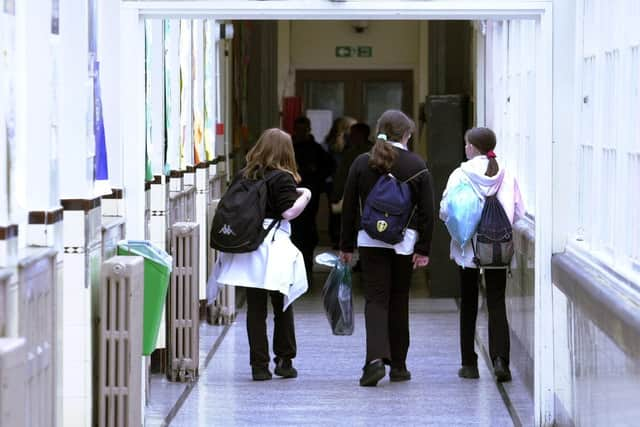The Working Classroom: Bradford-born author wants working class culture celebrated in schools
Melanie Phillips, columnist for The Times, has had her say: “Marxist drivel”. LBC radio host James O’Brien, meanwhile, was complimentary: “Wonderfully apposite and eloquent”.
And Matt Bromley, who co-wrote the book they refer to, is perfectly happy to take these opposing views.
Advertisement
Hide AdAdvertisement
Hide AdWhen he and Andy Griffith set out to write The Working Classroom – which contends there is a flawed education system favouring wealth and social status over ability or effort - they wanted to provoke.


“We knew that this was going to be quite a contentious book,” says the Bradford-born teacher and author, who is now based in Beverley.
The issue of classism in education, he says, “wasn't being acknowledged, either because it wasn't in some people's vested interests to acknowledge it because classism was working in their favour, or because many school leaders and teachers just weren't aware of the ways in which schools were set up to disadvantage working class children.”
So book’s sub-title explains their aims succinctly: “How to make school work for working-class students.”
Advertisement
Hide AdAdvertisement
Hide AdFormer secondary school headteacher Matt runs Bromley Education, an education consultancy company set up in 2012, and has more than 25 years of experience in the system. This includes, between 2013 and 2016, being the group director of a large further education college and multi-academy trust and responsible for improving the quality of teaching of around 30,000 students.


Matt, 46, grew up working class – his father was a joiner, his mother a dinner lady and cleaner – and started to understand early on that where a person was from played a major part in their opportunities.
"I know that my parents put a lot on the line to move house so that we could change catchment area so that I was given, and my older brother was also given, a better opportunity and a better start in life. So that's one of the first times where I was mindful. I was only maybe nine years old, but I was suddenly conscious that where we lived, and where I came from, was posing a barrier to a future kind of success.”
Later, at university – he wouldn’t go now, he says, because then he had a full grant when they existed – that sense of a class difference was even more evident and, once he got into teaching, he could see those patterns of disadvantage repeating themselves.
Advertisement
Hide AdAdvertisement
Hide AdIn secondary schools, there are three main problems, he and Andy argue in the book. Curriculum design, curriculum assessment and what he calls the hidden curriculum.
When it comes to curriculum deisgn, part of that is the content of what is taught, which they say is set by middle class professionals. “One of the things we say in the book is that we should start to celebrate more working classic heroes, we should make sure that our curriculum is more representative of our students’ own backgrounds and their own lives,” says Matt.
“If students don't see people like them in the curriculum, then they'll think, well, it's not for me and education is not for me, I'm not included. So I'll switch off or I'll not attend, which is one of the one of many reasons why attendance is so poor at the moment, because students aren't engaging with education. They don't see it being relevant to them.”
In terms of curriculum assessment, he refers to what the Association of School and College Leaders calls the ‘forgotten third’ – the 16-year-olds who do not achieve at least a grade 4 standard pass in GCSE English and maths at the end of 12 years of schooling – which Matt argues tends to be working class pupils.
Advertisement
Hide AdAdvertisement
Hide AdWhile he Matt says that it is partly a funding issue, he thinks more needs to be done about what he calls the “home advantage”.
He says: “Now students are more expected to work outside of school to do homework and independent study and so on. But of course students from disadvantage don't have the same home environment, they don’t often have a warm, safe, spacious environment and a quiet space to study. It's harder to engage in independent study if you live in a cold, cramped flat without internet, without a device and without parents who are present, and willing and able, to help you, or can afford private tuition. All of those privileges further advantage the already advantaged and, of course, disadvantage the already disadvantaged.”
The hidden curriculum also puts working class pupils behind, as “students who come from privilege tend to have access to a secret knowledge,” he says, meaning mannerisms, cultural tastes and knowledge about the works of writers, for example.
“This is not about social mobility,” he says, but celebrating the working class while simultaneously making sure that it is not a barrier to opportunities.
Advertisement
Hide AdAdvertisement
Hide AdAnd what of Phillips’ view? Matt says: “Society is not fair and schools, as microcosms of society, are also unfair, unequal places. Children who start school at a disadvantage are further disadvantaged by the education system. They get lower educational outcomes, are less likely to go onto further and higher education, are less likely to find meaningful, fulfilling employment and earn more, and are less likely to enjoy good health and wellbeing. Part of the cause is indeed an unfair distribution of wealth - working class children get less spent on them in school and in their communities, and have far less access to learning resources.
"A child’s birth is - all too often - their destiny. It is social class and wealth - in other words, the luck of one’s birth - not ability or hard work that defines a child’s success at school and in later life. I don’t think that’s morally right and I want to do something about it. So call me a Marxist; I’ll embrace the tag if that means I care about social justice and fairness, and if that means I want everyone to have an equitable chance in life and no one to be disadvantaged by the system.”
The Working Classroom is out now.
Comment Guidelines
National World encourages reader discussion on our stories. User feedback, insights and back-and-forth exchanges add a rich layer of context to reporting. Please review our Community Guidelines before commenting.